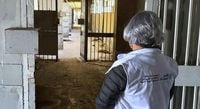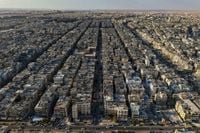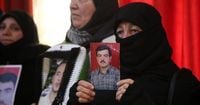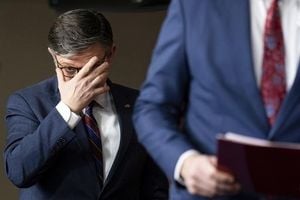In the aftermath of Syria’s long and brutal conflict, a new chapter is unfolding—a race against time to uncover the fate of the country’s missing, a tragedy that has touched nearly every family. With the fall of President Bashar Assad after more than five decades of rule, the question of what happened to as many as 300,000 people who vanished during years of violence, repression, and chaos has become one of the most urgent and painful legacies facing the nation.
At the heart of this effort is the Independent Institution on Missing Persons in Syria (IIMP), established by the United Nations General Assembly in 2023. Only after Assad’s ouster in December 2024 did the IIMP gain access to Syria, entering the country in January 2025. Its mission is daunting: to work with the newly formed Syrian Commission on Missing Persons, established by the transitional government in May 2025, and to coordinate a vast search for answers in a nation where, as Karla Quintana, the IIMP’s head, put it, “Everyone has someone or knows someone that is missing in Syria.”
Estimates of the missing are staggering. Before Assad’s fall, the number was believed to be around 130,000. But as Mohammed Reda Jalkhi, head of the Syrian commission, stated in August, the true figure could range from 120,000 to 300,000—or even more. Civil society groups echo these higher numbers, and the Syrian Network for Human Rights estimates that at least 3,700 children were forcibly disappeared by the Assad regime, with many given new identities and hidden in orphanages.
According to the Associated Press, the IIMP is investigating a wide array of disappearance cases: forcible disappearances by the Assad regime, children placed in orphanages by security services, and abductions by the Islamic State group. The most recent wave includes migrants and civilians who vanished after the regime’s collapse in late 2024. The complexity of these cases is immense, and the scale of the tragedy is almost unfathomable. “The crisis of the missing in Syria affects not only hundreds of thousands of families, but entire communities and the whole Syrian society,” Quintana told UN reporters during a press conference at UN Headquarters in New York on October 8, 2025, as reported by UN News.
But this is not a task for any single organization. “No one can morally bear the responsibility of failing to use all that is ready and available to use in Syria. Time is of essence and comparative experience should be taken into consideration,” Quintana emphasized. She underscored that the search must be Syrian-led and internationally supported, driven by the families whose determination has kept hope alive through years of uncertainty and fear. “Clarifying the fate of the missing is not only a matter of personal closure, but also a cornerstone of Syria's path toward justice, reconciliation and reform,” she said.
Every day, the IIMP is opening new lines of inquiry, developing advanced data analysis capabilities, and building a forensic network to help trace the missing. The institution is also working to create a comprehensive registry with detailed information on each case—a crucial step for all parties involved. Access to information, trust from families and society, and cooperation from the government are all essential, Quintana stressed.
The urgency is palpable. “We don’t want the families or the mothers of the missing to start dying before us being able to find an answer,” Quintana said. “We need to work as fast as possible.” For many families, the search for the missing is not just about closure—it is about survival, dignity, and the hope of justice. Behind every statistic lies a network of loved ones suspended between hope, fear, and mourning. As Quintana noted, “Every day matters. Every story we recover is a piece of Syria’s truth, before it’s lost forever.”
The IIMP’s efforts are not limited to Syrian nationals. The institution has met with representatives from countries whose citizens are missing in Syria—including the United States, Greece, Iraq, Italy, Jordan, Lebanon, and Poland—emphasizing the international dimension of the crisis. Coordination with Damascus is ongoing, and Quintana is expected to return to the Syrian capital in the week following October 9, 2025, with hopes of signing a memorandum of understanding with the Syrian commission. The aim is to formalize cooperation and ensure data sharing, which is vital to connecting the dots and piecing together the fate of so many lost souls.
DNA testing plays a crucial role in this work, but as Quintana explained, it is “only one element” in a long chain of inquiry that includes archives, testimonies, and field investigations. “It often comes at the end to confirm what we already know,” she said. The process is painstaking and often hampered by the destruction of records and the fading of memories. The IIMP is racing to recover as much information as possible before it is lost to time.
Women, as is so often the case in conflict and post-conflict societies, are at the forefront of the search. “In every country it is women who most often drive the search for loved ones and Syria is no exception,” Quintana observed. Their strength and resilience have been a driving force behind the establishment of both the IIMP and the new Syrian commission.
The Syrian government, now led by interim President Ahmad Al Shara, has signaled its commitment to addressing the issue of the missing. In May 2025, Al Shara signed a presidential decree establishing both a National Commission for Transitional Justice and a National Commission for Missing Persons. These bodies are tasked with investigating questions of accountability, reparations, and national reconciliation—key steps on the road to healing a deeply fractured nation.
According to Devdiscourse, the UN body’s collaboration with Syrian authorities and international partners is seen as crucial to uncovering the fate of the missing. The focus is on delivering answers to families as swiftly as possible, recognizing that “time is of the essence.” The IIMP is still a “very young institution,” as Quintana described it, fighting for access, information, and trust in a country where suspicion and trauma run deep.
For Syria, clarifying the fate of the missing is not just about the past—it is about building a foundation for justice, reconciliation, and reform. As the IIMP and the Syrian commission press ahead, the hope is that every story recovered, every answer found, will help heal a nation and honor those who have been lost. The work is far from over, but with determination, cooperation, and urgency, there is a path forward—one that may finally bring light to the darkness that has shrouded so many Syrian families for far too long.






